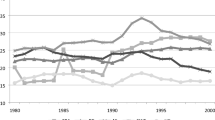Abstract
This research is part of a project that examines the nature of political ideology in the United States and its impact on the formulation of public policy. Here we explore the bases of liberal – conservative dissensus in areas of domestic policy other than business and the economy using a model developed by Janda, Berry, and Goldman. We find that the major elements of dissensus are: a strong conservative disposition to defend order; with a few exceptions a liberal indifference to order as conservatives define it; conservative opposition to the expansion of federal power over states or individuals and/or expansion in federal (and often state and local government) spending unless order is threatened; much greater liberal emphasis on equality; and varying conceptualizations of basic values to the degree that liberals and conservatives seem almost to be talking past each other using two different languages.
Similar content being viewed by others
References
Dijk, T. A. v. (1998). Ideology: A Multidisciplinary Approach. London: Sage.
Freeden, M. (1978). The New Liberalism: An Ideology of Social Reform. Oxford, England: Clarendon Press.
Galston, W. A. (1991). Liberal Purposes: Goods, Virtues, and Diversity in the Liberal State. Cambridge, England: Cambridge University Press.
Gold, H. J. (1992). Hollow Mandates: American Public Opinion and the Conservative Shift. Boulder, CO: Westview Press.
Grafton, C. and Permaloff, A. (2001). ‘Public policy for business and the economy: Ideological dissensus, change, and consensus,’ Policy Sciences 34: 403–434.
Grafton, C. and A. Permaloff (2004). ‘Supplementing Zupan's measurements of the ideological preferences of U.S. presidents,’ Public Choice 118: 125–131.
Grafton, C. and A. Permaloff (2005). ‘The behavioral study of political ideology and public policy formulation,’ The Social Science Journal 42: 201–213.
Grofman, B., R. Griffin and A. Glazer (1991). ‘Is the Senate more liberal than the House? Another look,’ Legislative Studies Quarterly 26: 281–295.
Gray, J. (1995). Liberalism. Minneapolis: University of Minnesota Press.
Hayek, F. A. v. (1960). The Constitution of Liberty. Chicago: University of Chicago Press.
Herrera, R. (1992). ‘The understanding of ideological labels by political elites,’ Western Political Quarterly 45: 1021–1033.
Heywood, A. (1992). Political Ideologies: An Introduction. New York: St. Martin's.
Janda, K., J. M. Berry and J. Goldman (1992). The Challenge of Democracy. Boston: Houghton Mifflin.
Johnston, L. (1996). Ideologies: An Analytical and Contextual Approach. Peterborough, Ontario, Canada: Broadview Press.
Kaus, M. (1992). The End of Equality. New York: Basic Books.
Kolodny, R. (1999). ‘Moderate party factions in the U.S. House of Representatives,’ in J. C. Green and D. M. Shea eds., The State of the Parties: The Changing Role of Contemporary American Parties. Lanham, MD: Rowman and Littlefield, pp. 271–285.
Lasswell, H. D., D. Lerner and I. De Sola Pool (1952). The Comparative Study of Symbols. Stanford, CA: Stanford University Press.
Levin-Waldman, O. M. (1996). Reconceiving Liberalism: Dilemmas of Contemporary Liberal Public Policy. Pittsburgh, PA: University of Pittsburgh Press.
Lowi, T. (1995). The End of the Republican Era. Norman: University of Oklahoma Press.
Manning, D. J. (1976). Liberalism. New York: St. Martin's.
Meadowcroft, J. S., ed. (1994). L. T. Hobhouse: Liberalism and Other Writings. Cambridge, England: Cambridge University Press.
Parsons, T. (1951). The Social System. New York: Free Press.
Permaloff, A. and C. Grafton (2003). ‘The behavioural study of political ideology and public policy: Testing the Janda, Berry, and Goldman model,’ Journal of Political Ideologies 8: 185–208.
Permaloff, A. and C. Grafton (in press). ‘ADA policies and the editorial positions of four publications,’ The Social Science Journal.
Reichley, A. J. (1981). Conservatives in An Age of Change: The Nixon and Ford Administrations. Washington, DC: Brookings Institution.
Ritchie, D. G. (1902). The Principles of State Interference: Four Essays on the Political Philosophy of Mr. Herbert Spencer, J. S. Mill and T. H. Green. London: Swan Sonnenschein.
Rossiter, C. L. (1995). Conservatism in America. New York: Knopf.
Sandel, M. J. (1984). Liberalism and Its Critics. New York: New York University Press.
Van Dyke, V. (1995). Ideology and Public Choice. Chatham, NJ: Chatham House.
Young, J. P. (1996). Reconsidering American Liberalism: The Troubled Odyssey of the Liberal Idea. Boulder, CO: Westview Press.
Author information
Authors and Affiliations
Corresponding author
Rights and permissions
About this article
Cite this article
Grafton, C., Permaloff, A. Liberal and conservative dissensus in areas of domestic public policy other than business and economics. Policy Sci 38, 45–67 (2005). https://doi.org/10.1007/s11077-005-1811-x
Issue Date:
DOI: https://doi.org/10.1007/s11077-005-1811-x




